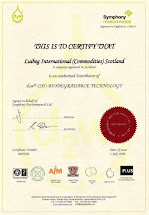
From www.icis.com/blogs/india-chemicals/
We may finally be seeing some balance in the debate on plastic bags and pollution. Rather than being swayed by NGOs to introduce a blanket ban on plastic bags, Jairam Ramesh, the new environment minister, is pushing for greater recycling, better waste management and the use of biodegradable plastics.
Scenes such as [this] certainly don't help the cause of the plastics industry.
Photo by Dwanjabi
A closer look at the picture shows that most of the bags are below 20 microns. The industry is all for banning these bags which litter the streets and clog the drains, but in the words of one industry insider - there is a lot of politics involved in banning these type of bags.
So you either have local governments, such as the one in Delhi, introducing a blanket ban or others that prefer to turn a blind eye to this problem.
The difficulty in implementing a ban that restricts use of all plastic bags does not appear to worry the Delhi government. Its stand was recently upheld by the Delhi High Court which dismissed a petition by the All India Plastics Manufacturers Association on this issue. Delhi has banned the use of plastic bags in shopping malls, five star hotels, restaurants, dairies and fruit and vegetable outlets.
Replacing plastics with jute or paper is not the answer as these alternatives have their limitations and can be environmentally unfriendly in their own way. Recycling is probably the best way forward.
And Conserve India is showing how this can be done fashionably. This non-profit organisation recycles polyethylene bags (hand picked from the streets of Delhi) into evening bags, totes and other fashion accessories.
It was in 2002 that Anita Ahuja of Conserve India got the idea of recycling bags. It took a year to develop the technology and simple end-products. Today, the organisation, which has created income generation opportunities for many of Delhi's rag pickers, deals not only with thin gauge plastic bags but also with other types of plastics and exports most of its production.
Ahuja explains that she is not for or against a ban on plastics in Delhi. "It is a global problem," she emphasises. She makes another valid point. Today, even the poorest of poor use common plastic bags in their homes. In some case, these bags, stitched together, double up as temporary roofs. The government should not be taking away what a poor man finds useful. There is plenty of other plastic packaging waste generated by rich households which the government is welcome to ban.



No comments:
Post a Comment